- Home
- Amanda Flower
Murders and Metaphors
Murders and Metaphors Read online
Murders and Metaphors
A MAGICAL BOOKSHOP MYSTERY
Amanda Flower
For My Dear Readers you brought Violet and Charming Books back to life
Some people seemed to get all sunshine, and some all shadow …
—Louisa May Alcott, Little Women
Acknowledgments
A very special thank you to my readers. Without you, Murders and Metaphors would never have happened. Your love for the Magical Bookshop Mystery series was so clear that it was able to continue in a new home. Violet, Rainwater, Grandma Daisy, Emerson, Faulkner, and I will be forever grateful to you for that.
Also, a very special thank you goes out to Crooked Lane Books—especially my editor, Anne Brewer—for giving Violet and the Magical Bookshop that new home.
As always, none of my novels would be possible without my superstar agent Nicole Resciniti. Nicole knew I loved these stories the most and fought to find them a new home. Thank you, my friend.
I also thank my family—Andy, Nicole, Isabella, and Andrew—for their love and support. And to my friends David and Mariellyn, thank you for listening to me work out all the plot points for this complicated story.
This novel owes a great debt to Louisa May Alcott. In researching her life and Little Woman for Murders and Metaphors, I was blown away by the visionary individual and writer she was. She lived and wrote on her own terms, but always put her family first. She was an incredible woman and writer and has my utmost respect.
Finally, to my Heavenly Father, thank you for letting me live my dream. There is nothing quite as magical to me as story. Thank you for letting me tell them time and again.
Chapter One
The cold wind bit into my bare cheeks and the tip of my nose as I ran down the snow-covered path like I was being pursued by a pack of wolves. Above my head, the woods’ bare tree branches reached toward me like wrinkled arms and were only made eerier by the cold clear sky and the bright white moon. No snow fell tonight; it was far too cold. On my back, I felt the judgmental yellow eyes of hundreds of woodland creatures. As I ran faster, the trees’ thin branches tore at the sleeves of my winter coat like bony fingers, imploring me back into the woods. I ran on but couldn’t push them away because my glove-covered hands were too busy protecting the precious cargo that I needed to deliver safely home.
There were no wolves chasing me. We didn’t have wolves in Cascade Springs, New York, and hadn’t in a hundred years. I was being pursued by time itself because, like the white rabbit in Alice in Wonderland, I was late, so very late.
As I slipped, tripped, and stumbled through the woods, I took care not to let a single drop of the precious spring water in my watering can escape. I couldn’t lose one drop of the water I had collected from the village’s mystical springs from which the village had earned its name. I needed every last drop to water my magical birch tree that grew in the middle of Charming Books, the bookshop I ran with my Grandma Daisy.
Two parts of what I just shared would have seriously confused the people who knew me back in grad school: the fact that I was running and the mention of a magical tree. I wasn’t athletic, and scholarly types didn’t believe in magic outside books. Had they heard me say either statement, they would have immediately concluded that I was just another doctoral student who had succumbed to madness in the pursuit of her PhD. Sometimes I thought they weren’t too far off the mark on that one.
The toe of my boot caught a tree root buried in the snow. I stumbled with a yelp but somehow remained upright, and more importantly, the water remained in the watering can. Don’t lose a drop, I reminded myself. Not one drop. I had to go at night to collect the water to avoid the risk of being seen by tourists or villagers. My family had kept this secret about the magical spring waters for the last two hundred years for fear that we would be ridiculed for having magic or even chased from the village. No one knew about the magic other than the Caretakers themselves. I wasn’t going to be the one who let it slip, even if that meant collecting water on such a cold night.
Finally, the backyard of the large periwinkle Victorian home that was Charming Books came into view as the path broke through the trees. I dared to increase my speed. I threw open the back gate, dashed up to the back door of the house, and stumbled into a dark mudroom next to the servants’ stairs leading to the second floor. A narrow archway in front of me opened into the large kitchen.
“Violet Waverly,” Grandma Daisy shouted as I skidded on the soles of my winter boots, which were so encrusted with snow and ice that they had lost their tread. With a yelp, I continued to glide along the kitchen’s polished pine floors. “You are late!”
And she was right. I was late, and I had no one to blame but myself. I had been the Caretaker of the shop for six months, and still I seemed to forget my most important responsibility that came with the job: watering the tree.
I ran by my grandmother, not bothering to stop and say hello or even wave. I ran through the kitchen and through the door that led to the main part of the shop.
The over-two-hundred-year-old birch tree grew in the middle of the large room, and even in the middle of winter was decorated with bright white, smooth bark and green leaves. Its trunk divided halfway up its length, and its branches reached for the skylight in the ceiling. A spiral staircase wove around the tree, leading to the children’s fairy loft and my apartment on the second floor of the giant house.
Faulkner, the shop crow, perched on his favorite spot, the second branch from the very top, and stared down at me in his best judgy manner. “You’re late, you’re late for a very important date!”
Apparently I wasn’t the only one who had Alice in Wonderland in mind on account of my latest scrape. Faulkner had come to my grandmother’s back door as a young bird with a broken wing, and when she nursed him back to health, he had just decided to stay. He’d had the run of the shop until my cat and I moved in.
My black-and-white tuxedo cat, Emerson, was strangely MIA. He was usually the first on the scene when there was any promise of commotion. Emerson loved commotion, loved being in the midst of it, and he certainly loved making it.
A ring of about six inches from the tree to the edge of the hardwood floor circled the birch. I sprinkled the precious water from the watering can into the dirt. When I shook the last drop from the can, I half expected something to happen. But, like always, nothing did. The tree only reacted when it wasn’t watered on schedule. Then, it showed its age. The leaves began to brown, and bark began to peel. It seemed that the magical spring water was the only thing that had kept it alive and out of hibernation the last two centuries, and the water had to be straight from the spring. I couldn’t collect it beforehand because it seemed to lose its magical properties. I had learned in the short time that I had been Caretaker of the tree and the shop that the magic didn’t care what I thought. The magic was much subtler and came from the books themselves.
I gave a sigh of relief. My most important job was done. The tree wouldn’t need water for another forty-eight hours. I promised myself and the tree I wouldn’t forget again.
“Violet!” my grandmother called from the kitchen.
I lowered my head like a young child who knew she was about to be scolded. Before I had been the Caretaker of the shop, it had been my grandmother’s job after her mother had passed it on to her over fifty years ago. I would have been willing to bet that in all that time, she had never once forgotten to water the tree, and she certainly hadn’t ever run through the woods like a crazy person.
“Violet!” my grandmother called again.
“Off with her head!” Faulkner cried from his perch.
I squinted up at the bird. “So not helping.”
He fluffed his feathers
to appear larger and walked up and down his favorite tree branch, bobbing his head. There’s nothing quite as humiliating as a crow making fun of you, even if you are the only one to see it.
“Violet!” Grandma Daisy called a third time. Her tone was a tad more urgent than the last time.
I gave Faulkner one more withering glare, and then I headed to the kitchen. I pushed opened the kitchen door, but Grandma Daisy wasn’t there. She was in the neighboring room. The office–slash–storage room had been the dining room back when the original house was built in 1813, just after the Battle of Lake Erie. When my great-grandmother had turned the house into a bookshop, the room had become the warehouse room where we received and sorted the books. I frowned as I saw that the room was in complete disarray again. Books, papers, and files were scattered across the computer desk and over the large dining table in the middle of the room that we used as our sorting station. The boxes that I had packed to ship out had been opened. I had spent most of the night before organizing the space, so it was more than a little heartbreaking to see the havoc my grandmother could wreak on a room in just a few hours’ time.
I didn’t even know why I bothered. Grandma Daisy and I would never see eye to eye on how things should be organized in the shop. I wanted everything in its place, but Grandma Daisy didn’t see that as a need since the books in the shop literally picked their customers themselves.
My seventy-something grandmother paced around the room. Her sleek silver bob that fell just below her ears brushed the side of her face. She wasn’t in her usual shop outfit: jeans and a Charming Books sweatshirt. Instead she wore a striking blue 1970s pantsuit complete with bell-bottoms that surely had come compliments of Sadie Cunningham, my friend and the owner of Midcentury Vintage, the local vintage clothing shop just across the street from our bookshop. Around her throat she wore a bedazzled white scarf with snowflakes all over it. Her cat-eye glasses completed her throwback outfit. If I’d tried to pull off that look, people would’ve thought it was Halloween. But on Grandma Daisy, the ensemble didn’t look costume-ish in the least. She looked like a movie star and was ready to go to the book signing we were hosting at a local winery that night.
I decidedly was not ready. I glanced down at my black puffy coat, jeans, and snow boots. I resembled a marshmallow that had been left over the firepit for far too long.
“Did you see this?” Grandma Daisy waved a piece of paper in the air. The white page flapped back and forth. “Did you see it?”
I stood in the doorway. “See what?”
“This!” She shook the paper again. “This!”
“I can’t really read it with you flapping it back and forth in front of my face like that.”
She blew a wayward hair out of her face and walked over and handed it to me. It was a printout of an email. The subject was BELINDA PERKINS BOOK SIGNING—REQUIREMENTS.
Dear Charming Books Proprietor: Please provide the following for Belinda’s book signing. As you know, she is a New York Times bestselling author of six expert-level books about wine and is accustomed to a certain level of service at her events.
I read through the list of requirements. “A certain level of service,” I muttered. “Belinda grew up in Cascade Springs. She knows what the village can provide, and this list should have been given to Morton Wineries, not us. I doubt she would even be interested in wine if she hadn’t grown up here.” There were several wineries in Cascade Springs and dozens in the Niagara region, but Morton Vineyards was one of the finest and had one of the best reputations for ice wine on either side of the American-Canadian border. I was certain that was why Belinda had picked that venue for the event.
I stared at the paper. “Some of these demands are ridiculous. ‘Temperature of the room to be seventy-four degrees, not a degree warmer or cooler. This is the temperature at which Belinda is most comfortable and can best engage with her readers.’ ”
“And security guard,” Grandma Daisy said.
“Security guard?”
She nodded. “At the bottom of the email. It says that Belinda would like a security guard present.” She shook her head. “Too late for that. I can be security. I’m pretty tough.” My grandmother showed me her bicep to prove it.
I looked heavenward. “Why would she need a security guard for a book signing in Cascade Springs? Doesn’t that seem odd to you? Does she need protection from a wild fan? I didn’t know sommeliers, or nonfiction writers, for that matter, had wild fans. They might be well known in the world of wine, but I doubt the general public cares all that much.”
My grandmother shrugged. “I’m glad that we have the opportunity to host the signing, but working with both Belinda’s publicist and Morton Vineyards has been a nightmare. I can’t wait for this night to be over.”
I couldn’t have agreed more. The book signing idea had come from Belinda’s book publicist. She had said that Belinda wanted to do a signing for her new book about wine tasting in her hometown. Grandma Daisy and I would have happily hosted the event in the shop, but that wasn’t good enough.
The publicist had said Belinda wanted the signing at a vineyard, and since Morton Vineyards was the more prestigious in the village, it was a natural fit, and the signing fell at the perfect time for the most foot traffic. It would take place during the Mortons’ annual ice wine harvesting party, when they, with the help of friends and other volunteers, harvested the frozen grapes left on the vines for ice wine. What neither the publicist nor Belinda had considered was that Morton Vineyards was just about the last place in the village, if not the planet, that I wanted to go.
I looked up from the paper. “Even if we wanted to, there are several items on here we can’t control. Did the Mortons get a copy of this? It will be at their venue.”
“I have no idea. Where on earth are we going to find free-trade white chocolate–covered cashews at this hour? Where does she think we live? NYC? We can’t just walk to the closest specialty store.”
“Yeah, the cashews are a bit of a challenge.” I frowned. “I would think that she would have sent this list when the signing was set up.”
Grandma Daisy pressed the back of her hand against her forehead like a 1940s movie siren. “We have to do it. We really can’t have publishers thinking that we blow off their requests.”
I arched an eyebrow. “Publishers can’t really be too pushy with us either. They need us to promote their books.” I looked at the email more closely. “Besides, I don’t think this came from Belinda’s publisher at all. The email address says [email protected]. I think this came from her assistant or a personal publicist. We’ll do our best, but with the signing starting in less than an hour, that’s all we can do.”
“Touché, my dear granddaughter. I knew that you’d be the one that would talk me off the ledge. We will just do the best we can.”
I nodded. “They can’t expect anything more. Even if they had given us this list a week ago when we first heard about the signing, we might not have been able to accommodate them. Some of these things—Icelandic spring water—just aren’t going to happen. Cascade Springs spring water is just as good if not better, but if we give it to her in a glass, she won’t know the difference.”
Grandma Daisy clapped her hands. “You are my granddaughter. We think on the same mischievous plane.”
I wasn’t sure if that was good or bad.
Grandma Daisy took the paper from my hand. “I’ll go to the market now.” She looked me up and down. “While you change. Then I will come back here to pick you up in my car.”
“Why can’t we take my car?” I couldn’t hide the faint whine in my voice.
She arched a silver eyebrow at me. “Because the number of books that we have to take to the signing will never fit in your Mini Cooper.”
“I’ll pack up the rest of books while you’re gone so we can shove everything into your ancient car when you get back.” My grandmother’s compact car was over thirty years old. Since she hardly ever drove the car, it was in good
condition—if you didn’t mind that the driver’s side door didn’t open and there was no power steering or power locks or windows. Other than that, it was great and had only a little over fifty thousand miles.
She shook her head. “The car isn’t that bad.”
“Tell that to my knees as I try to climb into the driver’s seat from the passenger side door.”
Grandma Daisy plucked her large parka off the desk chair and put it on. “I’m off, my dear. Do not worry. All will be well. The tree is watered. That’s the most important thing. The rest will fall into place.”
Even before it was confirmed, I knew deep in my heart that she was wrong.
Chapter Two
After my grandmother left, I carried the six cases of Belinda’s books to the front door so we could put them in Grandma Daisy’s car the moment she returned. Faulkner supervised my work from the tree. As I set the last heavy box on the pile, he bobbed his head. “Some people seemed to get all the sunshine, and some all shadow …”
I recognized the quote but couldn’t place where I had read or heard it before. Knowing it would come back to me eventually, I shot the crow another irritated glance before running up the spiral staircase to the second floor of the shop. Each step groaned as my foot fell on it.
The house had been built just after the War of 1812 by my ancestress Rosalee Waverly. Rosalee had found herself a widow with a small daughter after the war. She left her hometown and came to Cascade Springs because she had heard of the mystical and healing springs of the Niagara region. Even back then, Cascade Springs was a place where weary travelers stopped to bathe in and drink from the healing waters. When she came upon the village, Rosalee found the birch tree growing, and she knew the spiritualism about birch trees in Native American culture. She built her home around the tree and watered it twice a week with the mystical spring water. The tree lived much longer than it should’ve—and continued to thrive—and stories of people coming to Rosalee for help and healing were passed down through the family.

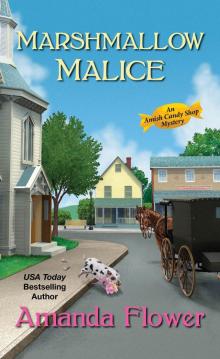 Marshmallow Malice
Marshmallow Malice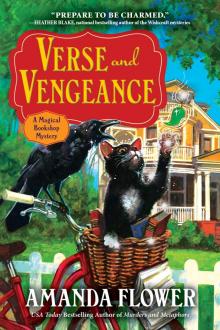 Verse and Vengeance
Verse and Vengeance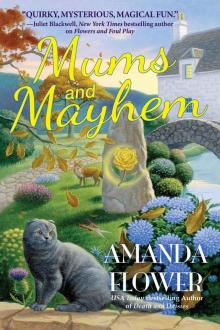 Mums and Mayhem
Mums and Mayhem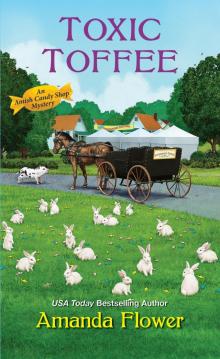 Toxic Toffee
Toxic Toffee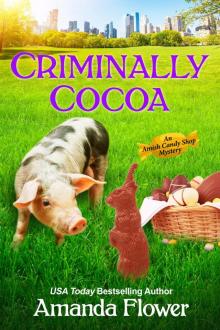 Criminally Cocoa
Criminally Cocoa Assaulted Caramel
Assaulted Caramel Maid of Murder aihm-1
Maid of Murder aihm-1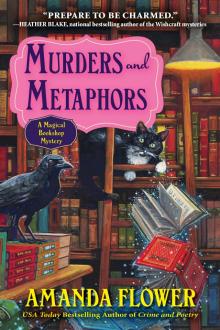 Murders and Metaphors
Murders and Metaphors Matchmaking Can Be Murder
Matchmaking Can Be Murder Maid of Murder (An India Hayes Mystery)
Maid of Murder (An India Hayes Mystery)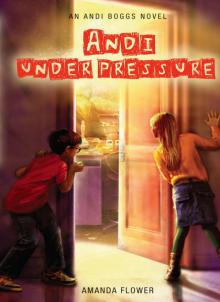 Andi Under Pressure
Andi Under Pressure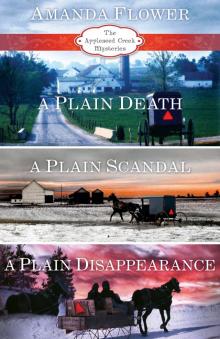 Appleseed Creek Trilogy, Books 1-3
Appleseed Creek Trilogy, Books 1-3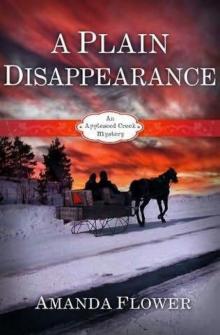 A Plain Disappearance
A Plain Disappearance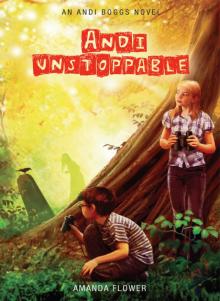 Andi Unstoppable
Andi Unstoppable The Final Vow
The Final Vow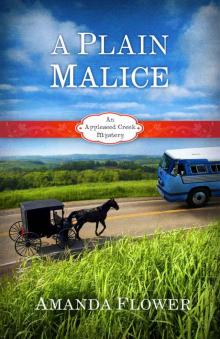 A Plain Malice: An Appleseed Creek Mystery (Appleseed Creek Mystery Series Book 4)
A Plain Malice: An Appleseed Creek Mystery (Appleseed Creek Mystery Series Book 4)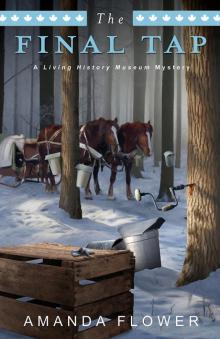 The Final Tap
The Final Tap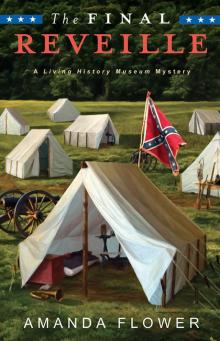 The Final Reveille: A Living History Museum Mystery
The Final Reveille: A Living History Museum Mystery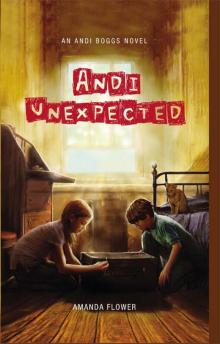 Andi Unexpected
Andi Unexpected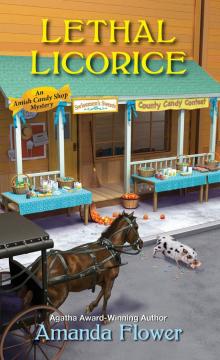 Lethal Licorice
Lethal Licorice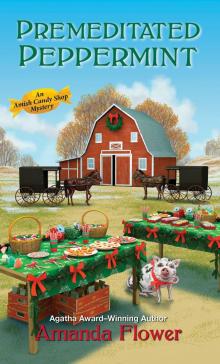 Premeditated Peppermint
Premeditated Peppermint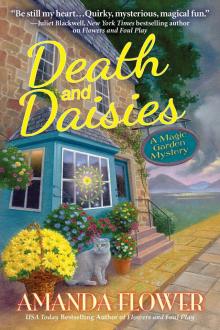 Death and Daisies
Death and Daisies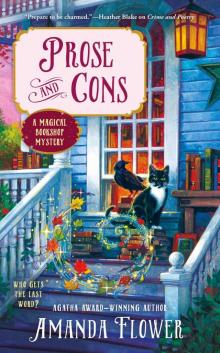 Prose and Cons
Prose and Cons